Nora Eisenberg tackles a touchy topic in When You Come Home – specifically, she writes about the mysterious Gulf War illness that afflicted a quarter of returning soldiers from the Gulf War, but, more generally, she explores the damage that soldiers sustain physically and emotionally during wartime. Continue reading “When You Come Home”
NewPages Blog
At the NewPages Blog readers and writers can catch up with their favorite literary and alternative magazines, independent and university presses, creative writing programs, and writing and literary events. Find new books, new issue announcements, contest winners, and so much more!
When You Come Home
Spread the word!
Festival :: Get Lit!
Get Lit!
April 10-19, 2009
Spokane, WA
The Northwest’s best festival for readers and writers features author presentations and readings, writing workshops and panels, author visits to schools throughout eastern Washington and into northern Idaho, youth poetry slams, and more. Many events are free to the public. The festival, now celebrating its 11th year, is produced by Eastern Washington University Press.
This year’s authors include: Simon Armitage, Charles Baxter, Margaret Lippert, Paul Roberts, Jane Smiley, David Suzuki, Ellen Wittlinger, Pamela Aidan, Zan Agzigian, Glenda Burgess, Patrick Carman, Sarah Conover, Chris Crutcher, Claire Davis, William Dietrich, Kathy Fagan, Deby Fredericks, Sam Green, Adina Hoffman, Christopher Howell, Sandra Hosking, Sherry Jones, John Keeble, Jim Kershner, Melissa Kwasny, Laurie Lamon, Ken Letko, Phillis Levin, Buddy Levy, Samuel Ligon, Tod Marshall, Brenda Miller, Kelly Milner Halls, Kenn Nesbit, Laurie Notaro, Oliver de la Paz, Midge Raymond, Claire Rudolf Murphy, Brandon Schrand, Martha Silano, Gregory Spatz, Mark Steilen, Rachel Toor, Manny Trembley and Eric Anderson, Kathryn Trueblood, Jeanette Weaskus
Spread the word!
Presidential Libraries – Obama Should Bag It
Cancel out any idea of an Obama Presidential Library? Some think so.
Spread the word!
Cautions for Online Publishing
Check out Jessica’s expose on the perils and pitfalls of online publishing: Now You Read It, Now You Don’t: A cautionary look at online magazines. A must read for writers and editors alike.
Spread the word!
Conference :: Gettysburg Review
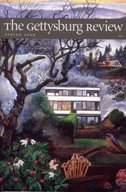 3rd Annual Gettysburg Review Conference for Writers
3rd Annual Gettysburg Review Conference for Writers
Gettysburg College, PA
June 3-8, 2009
The Gettysburg Review invites you to join them in creating a community of writers in a bucolic, convivial, and historic setting. Small workshops (maximum ten people per workshop) will be led by award-winning writers who have dedicated their lives to the teaching of poetry and prose. Limited scholarship support available.
Faculty include: Lee K. Abbott (fiction); Rebecca McClanahan (nonfiction); Dean Young (poetry)
Application Deadlines: Applications must be received by May 22, 2009. Scholarship applications must be postmarked by April 27, 2009.
Spread the word!
PEN Translation Feature
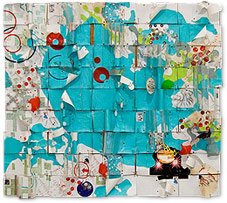 PEN 2009 Translation Feature
PEN 2009 Translation Feature
Speaking across geographies, styles, and literary conventions, this month’s Online Feature showcases some of the most interesting voices—old and new—in translation. Find recent translations of fiction and poetry from around the world, doing the work that Susan Sontag calls “the circulatory system of the world’s literatures.”
Spread the word!
How to Write About Africa
From the latest issue of Granta comes this essay, How to Write About Africa, by Binyavanga Wainaina. Should be required reading on at least a dozen lists I can think of: “Broad brushstrokes throughout are good. Avoid having the African characters laugh, or struggle to educate their kids, or just make do in mundane circumstances. Have them illuminate something about Europe or America in Africa. African characters should be colourful, exotic, larger than life — but empty inside, with no dialogue, no conflicts or resolutions in their stories, no depth or quirks to confuse the cause…”
Spread the word!
Tucson Festival of Books
Tucson Festival of Books
March 14-15, 2009
University of Arizona
Featured authors include Jimmy Santiago Baca, Josh Bazell, Jennifer Lee Carrell, Billy Collins, David Eagleman, Diana Gabaldon, Brent Ghelfi, Temple Grandin, J.A. (Judith) Jance, Elmore “Dutch” Leonard. and Richard Shelton. Separate events for children and teens.
Spread the word!
Paradise Finally Lost?
According to this article on Reutgers, Poet Laureate Andrew Motion believes students can’t “get past ‘go'” in such classics as Milton’s Paradise Lost without having basic knowledge of the Bible. Other classics that suffer in their loss of students understanding their full meaning also include Shakespeare, with something as simple as the title “Measure for Measure” (which comes from the Bible) being a lost reference for students.
Interestingly enough, Professor John Mullan comments that this lack of Biblical background may come from universities “accepting young people from much broader social backgrounds, with less frequent immersion in classical literature, than they had in the past.” Or perhaps more specifically, less exposure to the Bible and Christianity? (Though they do argue religious adherence is not a requirement.)
I’m sure it is a lament of every generation, but will there come a time when Milton and Shakespeare are no longer the “classics” to be studied? Will their references, regardless of how “archetypal” be so without point of grounding in student understanding that they become irrelevant? Me thinks it is only a matter of time…
Spread the word!
Yet Another Protest
Protests over one teacher’s inclusion of Ken Follet’s Pillars of the Earth draw encouraging support from her former students.
Spread the word!
New Lit on the Block :: Agricultural Reader
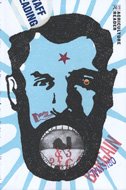 Technically not *new* Agricultural Reader is an arts annual founded in 2006 by Jeremy Schmall who currently edits the publication with Justin Taylor. However, the most recent issue (No. 3) is making its national debut via X-ing Books.
Technically not *new* Agricultural Reader is an arts annual founded in 2006 by Jeremy Schmall who currently edits the publication with Justin Taylor. However, the most recent issue (No. 3) is making its national debut via X-ing Books.
Agriculture Reader is interested in fiction, poetry, criticism, and “anything we haven’t seen before or even thought of yet.” They ask contributors to send a query letter rather than a submission: “Tell us about yourself, what you liked about our previous issues, and feel free to include a brief, representative sample of your work. We read queries year-round and respond, in the fullness of time, to all of our mail.”
The first issue includes works by Shimon Adaf, Christian Barter, Heather Christle Joshua Cohen, Julia Cohen, Dennis Cooper, Mark Edmund Doten, Will Edmiston, Elaine Equi, Christian Hawkey, Robert Hershon, Jen Hyde, Noelle Kocot, Justin Marks, Anthony McCann, Mike McDonough, Sharon Mesmer, Eileen Myles, Peter Orner, Joey Parlett, Stephen Priest, Ariana Reines, Jerome Sala, Tony Towle, Diane Williams, Rebecca Wolff, Matvei Yankelevich, and Matthew Zapruder.
You can get a sneak peek and some of the content and format on their website.
Spread the word!
Student Suspension is “Gross Abuse”
NYU’s Violation of Student Rights
Tuesday, February 24, 2009
From John K. Wilson’s post on College Freedom, “I was not a fan of the student occupation of a New York University cafeteria. I didn’t like the incoherent list of bizarre demands, and I don’t like the use of occupation as a tactic in general. But the response of NYU in suspending 18 students, who were arrested when the occupation was ended, is a gross abuse of due process.” Read the rest.
Spread the word!
How’s Your News?
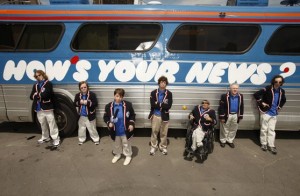 MTV’s latest series How’s Your News first began over ten years ago at a summer camp for adults with disabilities in Massachusetts. The current series grew out of the 1999 documentary directed by author Arthur Bradford (Dogwalker) and produced by South Park’s Trey Parker and Matt Stone. In the How’s Your News? film, Harrington, Bird, Perry, Costello, and Ronnie Simonsen (who’s currently battling leukemia) — all of whom attend Camp Jabberwocky, a Martha’s Vineyard camp for the disabled where Bradford is a counselor — pile into a tour bus and head west.
MTV’s latest series How’s Your News first began over ten years ago at a summer camp for adults with disabilities in Massachusetts. The current series grew out of the 1999 documentary directed by author Arthur Bradford (Dogwalker) and produced by South Park’s Trey Parker and Matt Stone. In the How’s Your News? film, Harrington, Bird, Perry, Costello, and Ronnie Simonsen (who’s currently battling leukemia) — all of whom attend Camp Jabberwocky, a Martha’s Vineyard camp for the disabled where Bradford is a counselor — pile into a tour bus and head west.
Along the way from New Hampshire to California, the group conduct a string of man-on-the-street interviews, and their conversations offer a funny and revealing look at how the disabled perceive and are perceived. The TV show follows the same general pattern, but it ups the star quotient somewhat, filming the HYN reporters as they interact with celebs like Sarah Silverman, Ben Affleck, and Amy Sedaris. (The Boston Phoenix)
Episodes from the series can be viewed in full on MTV’s website.
Erica J has her own to say on Disability Nation: Why I Really Didn’t Like “How’s Your News?”
Spread the word!
World Press Photo Contest
Check out the World Press Photo of the Year contest winners. The overall winner is a very telling image of our tough economic times: “Following eviction, Detective Robert Kole must ensure residents have moved out of their home. Cleveland, Ohio, 26 March”
Spread the word!
Press 53 Announces New Poetry Editor
Tom Lombardo is now Poetry Editor at Press 53. Last year (2008), Tom edited and published After Shocks: The Poetry of Recovery for Life-Shattering Events (Sante Lucia Books), which features 152 poems by 115 poets from 15 countries. Tom is a widely published and respected poet and is a graduate of the MFA program at Queens University in Charlotte, NC. His mission is to bring 4-6 poetry collections to Press 53 each year and to be the preliminary judge for Poetry in the Press 53 Open Awards.
Spread the word!
New Lit on the Block :: Specs
 Specs is an annual journal of contemporary culture and arts at Rollins College that “aims to create sympathetic interfaces between artistic and critical practices.” Spec accepts fiction, non-fiction, cultural criticism, artwork, poetry, and pieces that blur genre boundaries.
Specs is an annual journal of contemporary culture and arts at Rollins College that “aims to create sympathetic interfaces between artistic and critical practices.” Spec accepts fiction, non-fiction, cultural criticism, artwork, poetry, and pieces that blur genre boundaries.
The editors are particularly interested in works that examine contemporary culture and/or cross the critical/creative divide while riffing on the theme of “Faux Histories” in multiple ways.
Issue One contributors include: Douglas Barbour, Molly Bendall, Jeffrey L. Bohn, Christophe Cassamassima, D.P. Clark, Robert E. Clark, Glenn Deutsch, Denise Duhamel, Eliza Fernbach, Vernon Frazer, Jeanne Genis, Janis Butler Holm, Rosalie Morales Kearns, Amy Letter, Michael David Madonick, Kate Middleton, Sheila Murphy, T.A. Noonan, Melissa Parks, Chad Reynolds, Micah Riecker, Sarah Rosenblatt, Sankar Roy, Craig Saper, Jeff Solomon, Rodrigo Toscano, Lyzette Wanzer, Nina Zammit-Zorn, Slavoj Žižek
Spread the word!
Essayist Celebrates African-American Writers
Essayist Karen D. Culley offers an overview of black authors in American literature: African-American Writers: Legends of Literature
Spread the word!
Worst Love Poem Ever
Or at least for this year. Congratulations go to Morgan Ross for winning the Hayden’s Ferry Review Worst Love Poem/Flash Fiction Contest. Here’s just one stanza:
Your nose
is straight like an arrow,
it points to my heart.
You know you want to read it all…
Spread the word!
Wanted: Poems and Restaurants
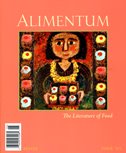 Alimentum , the only literary review all about food, will once again publish a poetry broadside of menupoems for National Poetry Month. The poems are distributed to participating restaurants for diners to enjoy some poetry with their menu! We need your poems! Only about a dozen poems will be selected. Click here to see past Menupoem examples. Deadline: March 4, 2009
Alimentum , the only literary review all about food, will once again publish a poetry broadside of menupoems for National Poetry Month. The poems are distributed to participating restaurants for diners to enjoy some poetry with their menu! We need your poems! Only about a dozen poems will be selected. Click here to see past Menupoem examples. Deadline: March 4, 2009
ATTENTION RESTAURANTS
(Readers – ask your favorite restaurants!)
Restaurants can participate by giving diners menupoems during National Poetry Month. Alimentum will ship a stack, and post the restaurant’s name and address on ther website throughout April. Participation is free! Write to Alimentum and let them know you’d like to take part in the menupoem party!
Spread the word!
New Lit on the Block :: Weave
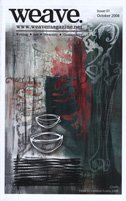 More than just a lit mag, Weave is an organization based out of Pittsburgh, PA that seeks “to create a space for a cross-section of writers and artists of all walks of life to meet on the page, on the stage, and in workshop. We celebrate diversity in both the creator and their works and strive to showcase both novice and established writers and artists.” Weave will host a series of workshops that focus on the writing and submissions processes as well as on bringing poetry to the stage as a viable performance art. Weave will also collaborate with writers from their publication to present readings that will showcase Pittsburgh’s young literary talent. During open submission dates, Weave accepts poetry, fiction, creative nonfiction, flash fiction, short plays and visual art.
More than just a lit mag, Weave is an organization based out of Pittsburgh, PA that seeks “to create a space for a cross-section of writers and artists of all walks of life to meet on the page, on the stage, and in workshop. We celebrate diversity in both the creator and their works and strive to showcase both novice and established writers and artists.” Weave will host a series of workshops that focus on the writing and submissions processes as well as on bringing poetry to the stage as a viable performance art. Weave will also collaborate with writers from their publication to present readings that will showcase Pittsburgh’s young literary talent. During open submission dates, Weave accepts poetry, fiction, creative nonfiction, flash fiction, short plays and visual art.
Issue One includes poetry by Ivy Alvarez, Mary Biddinger, Rachel Bunting, Juliet Cook, Crystal Hoffman, Tom Holmes, D.M. Huneke, Jason Kirin, Dana Guthrie Martin, Carol McCarthy, Khrys Myrddin, David McLean, Michael Constantine McConnell, Phoebe North, Michael Ogletree, J.R. Pearson, Molly Prosser, Jay Robinson, Daniel M. Shapiro, Susan Slaviero, Sarah J Sloat, Ringa Sunn, Frank X. Walker, fiction by Jack Cobb, Stephen Dorneman, Mehgan McKenna, Jack Swenson, Jared Ward, and art by Angela Bayout, Sofija Canavan, Sarah Greenwood, Nashay Jones, Bonnie MacAllister, Heidi Richardson Evans,
Spread the word!
Join Beloit Online
 Beloit Poetry Journal invites readers to join the online conversation with BPJ poets on their monthly Poet’s Forum. Participating poets change with each journal issue. For the newest issue (Spring 2009), poets include Greg Wrenn discussing the surprising genesis and formal evolution of “Centaur” for February, Fady Joudah will join the conversation next month, and Mary Leader the following month.
Beloit Poetry Journal invites readers to join the online conversation with BPJ poets on their monthly Poet’s Forum. Participating poets change with each journal issue. For the newest issue (Spring 2009), poets include Greg Wrenn discussing the surprising genesis and formal evolution of “Centaur” for February, Fady Joudah will join the conversation next month, and Mary Leader the following month.
Also now on BPJ‘s website, a “Poem for the Day” selected from the magazine’s 57-year archive.
Spread the word!
Comments on AWP :: Robert Gray
For anyone who has never attended the AWP conference and would like an overview persepective on it, check out Robert Gray’s post on Fresh Eyes Now. Here’s an excerpt:
“All those headlines declaring the book is dead and readers are an endangered species seemed to have little effect on the 8,000 writers, give or take a few hundred, who inundated the Hilton Chicago last week for the Association of Writers & Writing Programs annual conference. . . Was everyone attending the conference carrying a manuscript in their back pocket? Probably. Was the possibility high that few of those books would ever see the light of publication? No doubt. Did it matter? Not so much, at least not last week.”
Spread the word!
Canada :: Freedom to Read Week
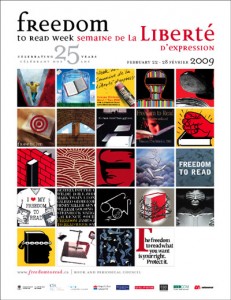 FREEDOM TO READ WEEK
FREEDOM TO READ WEEK
February 22-28, 2009
Freedom to read can never be taken for granted. Even in Canada, a free country by world standards, Freedom to Read Poster 2009 books and magazines are banned at the border. Books are removed from the shelves in Canadian libraries, schools and bookstores every day. Free speech on the Internet is under attack. Few of these stories make headlines, but they affect the right of Canadians to decide for themselves what they choose to read.
Spread the word!
New Lit on the Block :: Exquisite Corpse
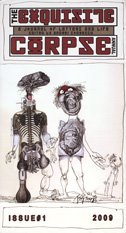 Originally in print in 1983, and online since 1996, the legendary Exquisite Corpse is now back in print with Issue #1, 2009. Editor in Chief Andrei Codrescu presents artwork by Ralph Steadman, Joel Lipman; poetry by Diane di Prima, Bill Berkson, Alice Notley, Mike Topp, Jim Gustafson, Ruxandra Cesereanu; prose by Jerome Rothenberg, Willie Smith, Aram Saroyan, Lance Olsen, Davis Schneiderman; and more. Still an online force to be reckoned with, Exquisite Corpse plans a yearly publication of both online reprint and new material.
Originally in print in 1983, and online since 1996, the legendary Exquisite Corpse is now back in print with Issue #1, 2009. Editor in Chief Andrei Codrescu presents artwork by Ralph Steadman, Joel Lipman; poetry by Diane di Prima, Bill Berkson, Alice Notley, Mike Topp, Jim Gustafson, Ruxandra Cesereanu; prose by Jerome Rothenberg, Willie Smith, Aram Saroyan, Lance Olsen, Davis Schneiderman; and more. Still an online force to be reckoned with, Exquisite Corpse plans a yearly publication of both online reprint and new material.
Spread the word!
NewPages Updates :: February 23, 2009
New Lit Mag Listings
The Ne’er-Do-Well – fiction, nonfiction
specs – fiction, non-fiction, cultural criticism, artwork, poetry
Mare Nostrum – poetry, essays, traveler’s tales, fiction, translations
Wordscapes – poetry, short story, environmental essays
Like Water Burning – fiction, nonfiction
The Smoking Poet – poetry, fiction, nonfiction, reviews
New Publisher Listing
Permanent Press – fiction, non-fiction
Spread the word!
Atwood Protests Dubai Festival
Canadian author Margaret Atwood has pulled out of an international Dubai literary festival after organizers banned a novel by a British author because it contains references to homosexuality.
In a letter addressed to the festival’s director, Atwood said she could not attend Dubai’s inaugural International Festival of Literature next week because of the “regrettable turn of events surrounding” the book “The Gulf Between Us.”
Spread the word!
Awards :: Glimmer Train Fiction Open :: February 2009
Glimmer Train has just chosen the winning stories for their December Fiction Open competition.
First place: Cary Groner of Tucson, AZ, wins $2000 for “Elaborate Preparations for Departure”. His story will be published in the Summer 2010 issue of Glimmer Train Stories, out in May 2010.
Second place: Aaron Carmichael of Broomfield, CO, wins $1000 for “Driver Yu’s Penance”. His story will also be published in an upcoming issue of Glimmer Train Stories.
Third place: Aaron Cutler of New York, NY, wins $600 for “15 Shots”.
A PDF of the Top 25 winners can be found here. This quarterly competition is open to all writers and all themes, with a word count range of 2000-20,000. Click here for guidelines
Also: Very Short Fiction Award competition (deadline February 28)
Glimmer Train hosts this competition twice a year, and first place is $1200 and publication in the journal. It’s open to all writers, no theme restrictions. Word count must not exceed 3000. Click here for complete guidelines.
Spread the word!
The Sun Gatherings
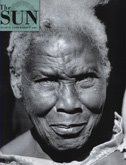 The Sun authors and readers, as well as editor and publisher Sy Safransky, gather for lively weekends of conversation, reflection, and inspiration. The Sun will host two gatherings this year: one on May 15–17 at the Rowe Conference Center in Rowe, Massachusetts, and the other on October 30–November 1 at the Esalen Institute in Big Sur, California. Online registration is now available.
The Sun authors and readers, as well as editor and publisher Sy Safransky, gather for lively weekends of conversation, reflection, and inspiration. The Sun will host two gatherings this year: one on May 15–17 at the Rowe Conference Center in Rowe, Massachusetts, and the other on October 30–November 1 at the Esalen Institute in Big Sur, California. Online registration is now available.
Spread the word!
True/False Film Fest :: Missouri
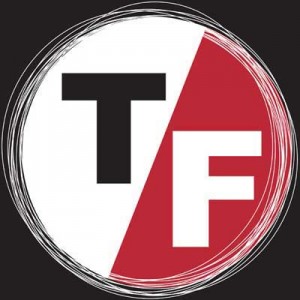 The True/False Film Fest returns for its sixth edition Feb. 26-March 1, 2009 in downtown Columbia, Missouri. Most films come freshly discovered from Sundance, Toronto and other festivals, others appear mysteriously before their official premieres elsewhere. The main venues are the Missouri Theatre Center for the Arts, the Blue Note, the two-screen Ragtag Cinema, the Forrest Theater at the Tiger Ballroom, as well as Stephens College’s Macklanburg Playhouse and Windsor Auditorium. Along with films are parties, workshops, and hosted debates.
The True/False Film Fest returns for its sixth edition Feb. 26-March 1, 2009 in downtown Columbia, Missouri. Most films come freshly discovered from Sundance, Toronto and other festivals, others appear mysteriously before their official premieres elsewhere. The main venues are the Missouri Theatre Center for the Arts, the Blue Note, the two-screen Ragtag Cinema, the Forrest Theater at the Tiger Ballroom, as well as Stephens College’s Macklanburg Playhouse and Windsor Auditorium. Along with films are parties, workshops, and hosted debates.
Spread the word!
ABR Mexico Writer’s Conference
 American Book Review Writer’s Conference
American Book Review Writer’s Conference
Cuernavaca, Mexico, March 16-18, 2009
Hosted by the University of Houston-Victoria and Unversidad Internacional
ABR Faculty: Charles Alcorn, Jeffrey Di Leo, Carmen Edington, Dagoberto Gilb, Macarena Hernandez, Tom Williams
You must apply by February 21, 2009 to attend the conference.
Spread the word!
New Lit on the Block :: The Fertile Source
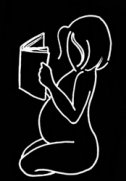 The Fertile Source is an online publication of Catalyst Book Press, a publisher of literary nonfiction with a special focus on fertility-related literature. They accept photos, artwork, literary essays, poems, and fiction on fertility-related themes, as well as book and magazine reviews on fertility-related publications, and will consider interviews with fertility, infertility, and adoption specialists.
The Fertile Source is an online publication of Catalyst Book Press, a publisher of literary nonfiction with a special focus on fertility-related literature. They accept photos, artwork, literary essays, poems, and fiction on fertility-related themes, as well as book and magazine reviews on fertility-related publications, and will consider interviews with fertility, infertility, and adoption specialists.
And yes, “fertility-related themes” include infertility, abortion, miscarriage, and adoption as well as childbirth, pregnancy, birth control, sex, postpartum depression, breastfeeding, and becoming a parent. They do accept “parenting topics” directly related to fertility.
The first issue includes a variety of works by Wendy Marcus, Lenard D. Moore, Julia Bauknecht, Joy Mosenfelder, Genna Gardini, Christopher Woods, Nancy Adams-Cogan, Ann Angel, China Martens, and Tania Pryputniewicz.
All submissions for the ezine will be considered for one of the many anthologies planned for publication in the upcoming months or years. Catalyst has already published the anthology Labor Pains and Birth Stories.
Spread the word!
Translate This!
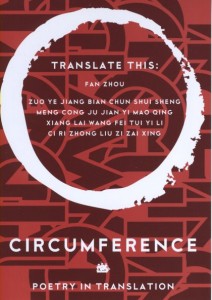 I picked this up at AWP, and can’t find it posted on their site yet. Circumference: A Journal of Poetry in Translation is accepting translations of the line below based only on their sound for their eighth homophonic feature:
I picked this up at AWP, and can’t find it posted on their site yet. Circumference: A Journal of Poetry in Translation is accepting translations of the line below based only on their sound for their eighth homophonic feature:
FAN ZHOU
ZOU YE JIANG BIAN CHUN SHUI SHENG
MENG CONG JU JIAN YI MAO QING
XIANG LA WANG FEI TUI YI LI
CI RI ZHONG LIU ZI ZAI XING
Send translations to:
Circumference
Center for Literary Translation
Columbia University
Dodge 415, MC 1804
New York, NY 10027
Or email:
editors – at – cirumferencemag.com
Spread the word!
Workshop :: American Short Fiction
The American Short Fiction Workshop Series launches March 4 with the online class Short Story Essentials: Writing Fiction for Publication. Hone your craft in this workshop led by editors and get the inside track on submitting to literary journals. Receive individualized attention and gain access to a supportive community of writers. Application deadline is February 20, 2009.
Spread the word!
AWP Chicago: A Gamer’s Notes
J.S. Tonutre, a designer for survival games for the newly fledged “aggression arcades” industry, gives his perspectic on AWP for Agni Online. Here’s an excerpt:
[WARNING: Do not drink hot liquid while reading, for any number of reasons as to why you might spill it on yourself!]
In AWP Convention Game regulations, a salutation, an exchange such as the above, between people who already know each other, technically counts for nothing. It must either be truncated—for economical use of time is vital—or else parlayed, turned to advantage. The point of play, if I haven’t made this clear enough yet, is to trade up, to advance the avatar, and the only way this can happen is when someone with a higher-stratum position (more publications, better publications, more ascertainable connections) sees you, and with that certification promotes you along the board. This is hardly arbitrary. For as everyone knows, being seen from a higher position only happens when there is something to be seen, though of course the appearance of being seen has value insofar as you might be seen being seen, and therefore score second-order points (described in game book) whether or not there is genuine substance behind the encounter. The calculus is very tricky, and point scoring is often hotly contested…[read the rest on Agni].
Spread the word!
Photography :: Fazal Sheikh
 Fazal Sheikh is an artist-activist who uses photography to create a sustained portrait of different communities around the world, addressing their beliefs and traditions, as well as their political and economic problems. By establishing a context of respect and understanding, his photographs demand we learn more about the people in them and about the circumstances in which they live.
Fazal Sheikh is an artist-activist who uses photography to create a sustained portrait of different communities around the world, addressing their beliefs and traditions, as well as their political and economic problems. By establishing a context of respect and understanding, his photographs demand we learn more about the people in them and about the circumstances in which they live.
I recommend you start with these, and look at the other related projects linked from there.
“For five hundred years the holy city of Vrindavan in northern India has been a haven for India’s dispossessed widows. Cast out by their families and condemned by strict marital laws, which deny them legal, economic, and in extreme case their human rights, they have made their way to the city to worship at its temples and live in its ashrams, surviving on charitable hand-outs or begging on the streets. In Vrindavan they worship the young god Krishna, who invades their dreams, helping them to cast off memories from their past life and prepare for a new and better life to come. Their ultimate dream is to reach moksha—heaven—where they will find freedom from the cycle of death and rebirth and live surrounded by their gods forever. Fazal Sheikh’s landscape photographs capture the meditative mood of the city and his portraits of the widows convey their sense of acceptance of life nearing its end and a longing for what is to come.”
As part of the ideology behind the International Human Rights Series and in order to bring the issues contained within Moksha to an international audience, it may be read in its entirety on-line in English, Hindi or Bengali.
“While working on the book Moksha, Sheikh went to Vrindavan, one of India’s holy cities, where Hindu widows come to live out their last years. It was while listening to their stories that he began to comprehend the full extent to which women in India are the victims of religious and cultural codes that reduce many of them to little more than child-rearing servants. He returned to India to find out more from young women growing up in a society that, whatever economic advances it may boast, is still widely prejudiced against them. Ladli—which in Hindi means ‘beloved daughter’—is the result.”
Spread the word!
Starting an Activist Group Toolkit
Provided by Amnesty International, this “Activist Toolkit” most definitely can be appreciated by anyone working with community and/or student activist groups. Provided fully online are helpful resources: starting a group, running a group, planning events and activities, and promotion. Each of these sections is loaded with separate and specific resources, such as how to recruit and keep members, how to run a meeting, how to lobby congress, etc. An absolute wealth of information, whether the goal is creating an Amnesty International group or any other activist group.
Spread the word!
Narrative Contest Expanded
Narrative has expanded their current “Third Person” contest to include entries written from any point of view – first, second, limited third, or omniscient. The contest is open to all fiction and nonfiction writer: short shorts, short stories, essays, memoirs, all forms of literary nonfiction, and excerpts from longer works of both fiction and nonfiction.
Spread the word!
Postdoc Researcher :: The Southern Review
The Southern Review announces an opening for a Postdoctoral Researcher (The Southern Review Resident Scholar). This is a two-year, non-renewable twelve-month appointment and carries a salary of $32,000 and benefits (pending final administrative approval). Preferred start date is August 1, 2009. Founded in 1935 by Robert Penn Warren and Cleanth Brooks, The Southern Review is published four times a year on the campus of Louisiana State University. For more information, please check The Southern Review website.
Spread the word!
Home Again Home Again
AWP 2009 has come to a close, and NewPages is exhausted and recharged all at the same time!
What great energy we give and receive during those chaotic three days of sessions, bookfair, readings, and dinner talks. And what a difference this year was from five years ago, when NewPages first began rolling the aisles among the journals and publishers, trying to explain our work and hearing: “New what? You do what?” to this year, hearing random shout-outs from people in the halls, “I love NewPages!” and overhearing one magazine editor say to another, “You’re on NewPages, right?”
Thanks to ALL of you. It can really be lonely work sitting here behind the computer all year, plugging away at links and trying to make the best selections for the site, hoping readers are finding the site useful and usable. Three days at AWP really helps us to connect and know that we’re on the right track here, and not just because of what we do, but because of what so many other people are doing.
As I said time and again when editors thank us for what we do, we thank them right back. NewPages could not do what it does without the great efforts of so many other people who love to read and write, and, like me, who love to help make those connections between readers and writers.
And this year seemed especially upbeat, even given the downward spiral in the economy. More so than last year’s AWP, I heard journal staff say they had gained subscribers – SO IMPORTANT – and publishers say they had sold out of books or at the very least were actually making sales this time. Not that anyone who goes to the AWP bookfair will regain their costs to go (at least none I know of!), but to know that there is support, there is interest, this is all very promising for the future of literature and of reading we have so often heard bemoaned.
I think it was a wonderful AWP, and I’m already looking forward to next year, Denver, Colorado, where I’d like to see this famed midwest hospitality continued and even surpassed.
More on AWP later. For now, a bit of R&R – rest and reading.
Spread the word!
Ascent – Spring 2008
At the risk of sounding a bit dramatic, I have to say I was enthralled by the beauty contained within Ascent, the seasonal literary journal out of Concordia College. Filled with highly-memorable essays, poems and short stories, this issue found a place inside my tote bag for over a week as I found myself rereading it several times. Continue reading “Ascent – Spring 2008”
Spread the word!
The Gettysburg Review – Winter 2008
The Washington Post once accused this journal of “carrying literary elitism to new, and annoying, heights,” and TGR proudly uses this quote in their advertising. Under the expert guidance of editor Peter Stitt, they have been consistently presenting high level fiction, nonfiction, poetry, criticism, and art for many years. I have always been particularly attracted to the poetry, which ranges from the lyrical and evocative to the audacious. Continue reading “The Gettysburg Review – Winter 2008”
Spread the word!
GLOSSOLALIA – Fall 2008
GLOSSOLALIA is devoted to the rare breed in the literary world known as flash fiction, pieces that are most often 500 words or less. With its abstract tic-tac-toe cover and its theme for this issue, “Tongues on Fire,” one gets the sense that the miniscule fraction of experiences that these narratives expose us to, as well as the time that passes us each day, are meant to be digested as rapidly as life seems to happen. Continue reading “GLOSSOLALIA – Fall 2008”
Spread the word!
The G.W. Review – Spring 2008
By accident, or by design, I’m not sure which, this issue of George Washington University’s student-led magazine is ripe with food imagery. The award-winning student fiction (called “Senior Contest”) sets the tone with Jessica Deputato’s “Flour and Water,” a story about food, family, and flesh (tattoos) – the undiluted bonds between them. A poem by Andrew Payton, “The Kraft Macaroni and Cheese Blues,” continues the food theme, albeit tongue in cheek, or should I say fork in powdered yellow cheese substitute. Amy Katzel’s poem, “I am Peeling You,” moves the reader from the endless possibilities in the title (eggs? apples? potatoes?) to a more graphic, no less food-oriented exploration (“off my eggshell wall”) and lament (“We did this to each other, / my voice, yours, / Minutes and years, mornings // all the slices of burnt toast, gallons of milk, / books started and finished”). Janelle Holden remembers a different kind of breakfast, one that evokes the flavors of a trip to “San Ignacio, Belize”: Continue reading “The G.W. Review – Spring 2008”
Spread the word!
The Kenyon Review – Winter 2009
A glorious 70th anniversary issue. “Within these pages we offer a model of what KR has aspired to across those decades,” explains the editor’s note, “remarkable stories by friends of long-standing…and emerging authors who offer vibrancy and freshness right now and who may well come to take their own places among the renowned.” Long-standing friends in this issue include Joyce Carol Oates, E.L. Doctorow, and Carl Phillips. This issue’s “New Voice” is poet Kascha Semonovitch, introduced by Kenyon Review poetry editor David Baker. The edition also features the winners of the magazine’s short fiction contest (limited to writers under 30 with submissions of no longer than 1200 words, selected and introduced by Alice Hoffman); poems by a roster of “poetry stars,” in addition to Carl Phillips (Linda Gregerson, Michael S. Harper, Rachel Hadas, Carol Muske-Dukes, among others); and essays by Rebecca McLanahan, Wyatt Prunty, and Alfred Corn. Continue reading “The Kenyon Review – Winter 2009”
Spread the word!
Miranda Literary Magazine – Winter 2008
This is a somewhat quirky fledgling literary magazine that is just cranking up and has fond hopes for its future. Not only are the winter offerings presented online, but a print edition is also available for purchase. The website is a little difficult to negotiate, but the offerings range from fiction and poetry to interviews and book reviews. Continue reading “Miranda Literary Magazine – Winter 2008”
Spread the word!
Narrative Magazine – Fall 2008
Anyone wishing to peek into the future of the online literary magazine needs only to pull this one up on their screen. There is a brief signing up process and then an impressive array of work that is available for the choosing. This particular issue has fiction, nonfiction, poetry, “features,” and one “classic,” which happens to be an essay on writing by W. H. Auden. To keep one further entertained, the website has cartoons that are changed regularly, a “ Poem of the Week,” and a “Story of the Week.” Continue reading “Narrative Magazine – Fall 2008”
Spread the word!
New England Review – 2008
Fifteen pages devoted to a new translation of Jean de la Fontaine’s 17th century fables in verse (translated by Craig Hill)? How could these little tales of “country wisdom” interest me, I wondered? Wow, did I rush to a hasty and erroneous judgment! This is marvelous stuff. An impressive translation of work that is much more engaging and original than I remembered from college French classes. Difficult work, this example of “Revisitations,” as this section of the journal is called – verse that rhymes to mirror the original with precision, grace, and panache. And de la Fontaine’s little stories aren’t half bad either! These translations are from a full-length collection of the fables out this past fall from Arcade with illustrations – imagine! – by Edward Gorey. Continue reading “New England Review – 2008”
Spread the word!
New Letters – 2008/2009
We enter our 75th year true to our mission, with three newer voices in fiction – Olufunke Grace Bankole, Ryan Clary, and Stephanie Powell Watts, who have no books yet but surely will – and one voice established and admired – a poet, essayist, and storyteller – Paul Zimmer…The same variety occurs among the poets and essayists – each generation of literary writer offering hope that we need not stay in the realm of ideology or ideas, but can move to something deeper, more human, more fun. Continue reading “New Letters – 2008/2009”
Spread the word!
New York Tyrant – Number 2
Tyranny. Power. Virulence. Virile. Vigorous. Vivid. I finally found my way from the authority to mastery. The New York Tyrant is, if nothing, both powerful (read strong language, strong images, strong opinions) and masterful (read self-assured, forceful, and determined). It’s also virile in a more conventional sense (predominately male contributors) and in a literary sense (muscular, aggressive). Continue reading “New York Tyrant – Number 2”
Spread the word!
North Dakota Quarterly – Winter 2008
My favorite part of North Dakota Quarterly is the “sea changes” – poetic little narratives about books that changed the reader’s (now the writer’s) life (way of thinking). This issue is swimming in fine poems, stories, and essays, nonetheless, I am most taken with these musings about “books that matter” and appreciate the chance to engage with something that is part personal essay, part “lit crit” of a sort, part book review, and part something new, a kind of “moment in time” memoir, for as the editors explain in their note, “the impact of a book depends not only on how it is read but when” (emphasis theirs). Fred Arroyo discusses V.S. Naipul. Robert Lacy explores his relationship with Joyce. Richard C. Kane considers Bruce Chatwin. Engaging, too, in the same way is Patrick Madden’s “Divers Weights and Divers Measures,” an essay of observations and musings about encounters with people in Montevideo, bookended by a consideration of the work of the prolific, insightful, and influential Uruguayan writer Eduardo Galeano. Continue reading “North Dakota Quarterly – Winter 2008”
